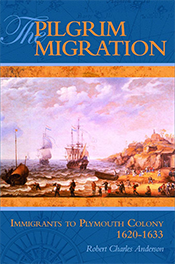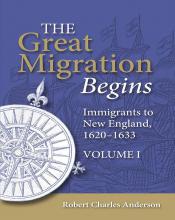EDWARD LEISTER
Edward Leister came to Plymouth on the Mayflower in 1620, as one of Stephen Hopkins's two servants. According to Bradford, "Lester, after he was at liberty, went to Virginia and there died" [Bradford 442, 445]. He signed the Mayflower Compact on 11 November 1620. From Mourt's Relation: 1621 June 18. The second offense is the first duel fought in New England, upon a challenge at single combat with sword and dagger, between Edward Doty and Edward Leister, servants of Mr. Hopkins. Both being wounded, the one in the hand, the other in the thigh, they are adjudged by the whole company to have their head and feet tied together, and so to lie for twenty-four hours, without meat or drink; which is begun to be inflicted, but within an hour, because of their great pains, at their own and their master's humble request, upon promise of better carriage, they are released by the governor" [Young's Pilgrim Fathers 201].
COMMENTS: Following STEPHEN HOPKINS in the 1623 division of land are two men with first name Edward but without surnames; these must be his two servants, EDWARD DOTY and Edward Leister. But Leister is not in the 1627 division of cattle, so he must have left for Virginia between those two dates. He does not appear in the February 1623/4 list of those in Virginia living and dead, or in the February 1624/5 Virginia muster of inhabitants.

The Pilgrim Migration: Immigrants to Plymouth Colony 1620-1633
Buy the print edition of The Pilgrim Migration: Immigrants to Plymouth Colony 1620-1633.

The Great Migration Begins: Immigrants to New England 1620-1633
Buy the print edition of The Great Migration Begins: Immigrants to N.E. 1620-1633 Vols I-III.
Become an American Ancestors.org member to access this biography and over 40,000 more records in the searchable online database of The Great Migration Begins: Immigrants to N.E. 1620-1633 Vols I-III.
This authoritative work by Robert Charles Anderson identifies and describes all Europeans who settled in New England prior to the end of 1633. Each individual or family entry includes (when known) the port or country of origin; when and on what ship they arrived in New England; the earliest known record of the individual or family; their first and subsequent residences; return trips to their country of origin; marriages, births, and deaths; and other important family relationships. This work is available in print and database form on AmericanAncestors.org.




